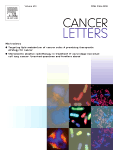 Two authors who had a paper retracted for fake peer review in 2015 have lost another for the same reason.
Two authors who had a paper retracted for fake peer review in 2015 have lost another for the same reason.
Elsevier recently retracted the second paper by the duo, a 2015 paper in a cancer journal, after finding evidence of fake peer review. The paper was submitted in October 2014 and accepted just a week before our piece on fake peer review appeared in Nature.
According to the notice, after investigating the paper, which appeared in Cancer Letters, the publisher concluded that it was accepted “based upon the positive advice of at least two faked reviewer reports.” The notice also explained that the identities of several authors “could not be confirmed.”
This appears to be the second fake peer review offense for the corresponding authors—Augus N. Bethune and Shi Hu, who are both based at the Tianjin Joint Academy of Biomedicine and Technology in China. In 2015, the journal Amino Acids retracted a paper from Bethune, who was a corresponding author, and Hu, a middle author, because “the peer review process was compromised.”
Here’s the retraction notice from Cancer Letters:
After a thorough investigation, the Publisher has concluded that the acceptance of this article was based upon the positive advice of at least two faked reviewer reports. The reports were submitted from fictitious email accounts which were provided to the journal as suggested reviewers during the submission of the paper. In addition some author identities could not be confirmed.
“Silencing EGFR/HER3 signaling with a novel anti-EGFR domain II/IV antibody” has been cited once, according to Clarivate Analytics’ Web of Science.
The papers in Cancer Letters and Amino Acids have two other authors in common: Wenyan Fu, from PLA Postgraduate School of Medicine in China, and Hiroaki Takeda, from Nagoya City University Graduate School of Medical Sciences in Japan.
Elsevier told Retraction Watch they have nothing to add to the retraction notice. We’ve contacted Hu and Bethune, and will update the post if we hear back.
By our count, well over 500 papers have been affected by fake peer review.
Like Retraction Watch? Consider making a tax-deductible contribution to support our growth. You can also follow us on Twitter, like us on Facebook, add us to your RSS reader, sign up on our homepage for an email every time there’s a new post, or subscribe to our new daily digest. Click here to review our Comments Policy. For a sneak peek at what we’re working on, click here.
LOL!